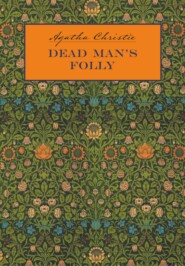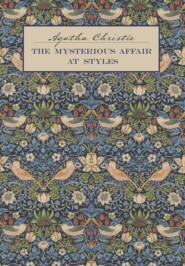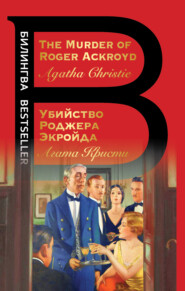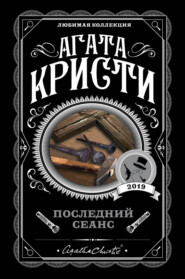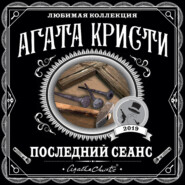По всем вопросам обращайтесь на: info@litportal.ru
(©) 2003-2024.
✖
The Adventure of the Egyptian Tomb: A Hercule Poirot Short Story
Автор
Год написания книги
2018
Настройки чтения
Размер шрифта
Высота строк
Поля
The Adventure of the Egyptian Tomb: A Hercule Poirot Short Story
Agatha Christie
A classic Agatha Christie short story, available individually for the first time as an ebook.One by one the men who discovered and opened the tomb of King Men-He-Rah are beginning to die. Superstition spreads that they have been cursed by the dead king. Poirot is asked to investigate the supernatural deaths by a concerned mother. Hastings is left bewildered when Poirot asserts his belief in the supernatural…
The Adventure of the Egyptian Tomb
A Short Story
by Agatha Christie
Copyright (#ulink_c7f8f830-a058-56f2-8a7b-15abf64115fd)
Published by HarperCollinsPublishers Ltd 1 London Bridge Street London SE1 9GF www.harpercollins.co.uk (http://www.harpercollins.co.uk)
Copyright © 1999 Agatha Christie Ltd.
All rights reserved under International and Pan-American Copyright Conventions. By payment of the required fees, you have been granted the non-exclusive, non-transferable right to access and read the text of this e-book on-screen. No part of this text may be reproduced, transmitted, downloaded, decompiled, reverse engineered, or stored in or introduced into any information storage and retrieval system, in any form or by any means, whether electronic or mechanical, now known or hereinafter invented, without the express written permission of HarperCollins e-books
HarperCollinsPublishers has made every reasonable effort to ensure that any picture content and written content in this ebook has been included or removed in accordance with the contractual and technological constraints in operation at the time of publication.
Ebook Edition © MAY 2013 ISBN: 9780007526420
Version: 2017-04-13
Contents
Cover (#uce58c1ba-5c52-58e3-8418-6e7c90e5b94b)
Title Page (#u90472f02-8503-5042-a5ff-66fde1cf2aff)
Copyright
The Adventure of the Egyptian Tomb
Related Products (#litres_trial_promo)
About the Publisher (#litres_trial_promo)
The Adventure of the Egyptian Tomb (#ulink_5e8c1859-19e3-5177-846c-7a8180c8fa60)
‘The Adventure of the Egyptian Tomb’ was first published in The Sketch, 26 September 1923.
I have always considered that one of the most thrilling and dramatic of the many adventures I have shared with Poirot was that of our investigation into the strange series of deaths which followed upon the discovery and opening of the Tomb of King Men-her-Ra.
Hard upon the discovery of the Tomb of Tutankh-Amen by Lord Carnarvon, Sir John Willard and Mr Bleibner of New York, pursuing their excavations not far from Cairo, in the vicinity of the Pyramids of Gizeh, came unexpectedly on a series of funeral chambers. The greatest interest was aroused by their discovery. The Tomb appeared to be that of King Men-her-Ra, one of those shadowy kings of the Eighth Dynasty, when the Old Kingdom was falling to decay. Little was known about this period, and the discoveries were fully reported in the newspapers.
An event soon occurred which took a profound hold on the public mind. Sir John Willard died quite suddenly of heart failure.
The more sensational newspapers immediately took the opportunity of reviving all the old superstitious stories connected with the ill luck of certain Egyptian treasures. The unlucky Mummy at the British Museum, that hoary old chestnut, was dragged out with fresh zest, was quietly denied by the Museum, but nevertheless enjoyed all its usual vogue.
A fortnight later Mr Bleibner died of acute blood poisoning, and a few days afterwards a nephew of his shot himself in New York. The ‘Curse of Men-her-Ra’ was the talk of the day, and the magic power of dead-and-gone Egypt was exalted to a fetish point.
It was then that Poirot received a brief note from Lady Willard, widow of the dead archaeologist, asking him to go and see her at her house in Kensington Square. I accompanied him.
Lady Willard was a tall, thin woman, dressed in deep mourning. Her haggard face bore eloquent testimony to her recent grief.
‘It is kind of you to have come so promptly, Monsieur Poirot.’
‘I am at your service, Lady Willard. You wished to consult me?’
‘You are, I am aware, a detective, but it is not only as a detective that I wish to consult you. You are a man of original views, I know, you have imagination, experience of the world; tell me, Monsieur Poirot, what are your views on the supernatural?’
Poirot hesitated for a moment before he replied. He seemed to be considering. Finally he said:
‘Let us not misunderstand each other, Lady Willard. It is not a general question that you are asking me there. It has a personal application, has it not? You are referring obliquely to the death of your late husband?’
‘That is so,’ she admitted.
‘You want me to investigate the circumstances of his death?’
‘I want you to ascertain for me exactly how much is newspaper chatter, and how much may be said to be founded on fact? Three deaths, Monsieur Poirot – each one explicable taken by itself, but taken together surely an almost unbelievable coincidence, and all within a month of the opening of the tomb! It may be mere superstition, it may be some potent curse from the past that operates in ways undreamed of by modern science. The fact remains – three deaths! And I am afraid, Monsieur Poirot, horribly afraid. It may not yet be the end.’
‘For whom do you fear?’
‘For my son. When the news of my husband’s death came I was ill. My son, who has just come down from Oxford, went out there. He brought the – the body home, but now he has gone out again, in spite of my prayers and entreaties. He is so fascinated by the work that he intends to take his father’s place and carry on the system of excavations. You may think me a foolish, credulous woman, but, Monsieur Poirot, I am afraid. Supposing that the spirit of the dead King is not yet appeased? Perhaps to you I seem to be talking nonsense –’
‘No, indeed, Lady Willard,’ said Poirot quickly. ‘I, too, believe in the force of superstition, one of the greatest forces the world has ever known.’
I looked at him in surprise. I should never have credited Poirot with being superstitious. But the little man was obviously in earnest.
‘What you really demand is that I shall protect your son? I will do my utmost to keep him from harm.’
‘Yes, in the ordinary way, but against an occult influence?’
‘In volumes of the Middle Ages, Lady Willard, you will find many ways of counteracting black magic. Perhaps they knew more than we moderns with all our boasted science. Now let us come to facts, that I may have guidance. Your husband had always been a devoted Egyptologist, hadn’t he?’
‘Yes, from his youth upwards. He was one of the greatest living authorities upon the subject.’
‘But Mr Bleibner, I understand, was more or less of an amateur?’
‘Oh, quite. He was a very wealthy man who dabbled freely in any subject that happened to take his fancy. My husband managed to interest him in Egyptology, and it was his money that was so useful in financing the expedition.’
‘And the nephew? What do you know of his tastes? Was he with the party at all?’
‘I do not think so. In fact I never knew of his existence till I read of his death in the paper. I do not think he and Mr Bleibner can have been at all intimate. He never spoke of having any relations.’
‘Who are the other members of the party?’
‘Well, there’s Dr Tosswill, a minor official connected with the British Museum; Mr Schneider of the Metropolitan Museum in New York; a young American secretary; Dr Ames, who accompanies the expedition in his professional capacity; and Hassan, my husband’s devoted native servant.’
Agatha Christie
A classic Agatha Christie short story, available individually for the first time as an ebook.One by one the men who discovered and opened the tomb of King Men-He-Rah are beginning to die. Superstition spreads that they have been cursed by the dead king. Poirot is asked to investigate the supernatural deaths by a concerned mother. Hastings is left bewildered when Poirot asserts his belief in the supernatural…
The Adventure of the Egyptian Tomb
A Short Story
by Agatha Christie
Copyright (#ulink_c7f8f830-a058-56f2-8a7b-15abf64115fd)
Published by HarperCollinsPublishers Ltd 1 London Bridge Street London SE1 9GF www.harpercollins.co.uk (http://www.harpercollins.co.uk)
Copyright © 1999 Agatha Christie Ltd.
All rights reserved under International and Pan-American Copyright Conventions. By payment of the required fees, you have been granted the non-exclusive, non-transferable right to access and read the text of this e-book on-screen. No part of this text may be reproduced, transmitted, downloaded, decompiled, reverse engineered, or stored in or introduced into any information storage and retrieval system, in any form or by any means, whether electronic or mechanical, now known or hereinafter invented, without the express written permission of HarperCollins e-books
HarperCollinsPublishers has made every reasonable effort to ensure that any picture content and written content in this ebook has been included or removed in accordance with the contractual and technological constraints in operation at the time of publication.
Ebook Edition © MAY 2013 ISBN: 9780007526420
Version: 2017-04-13
Contents
Cover (#uce58c1ba-5c52-58e3-8418-6e7c90e5b94b)
Title Page (#u90472f02-8503-5042-a5ff-66fde1cf2aff)
Copyright
The Adventure of the Egyptian Tomb
Related Products (#litres_trial_promo)
About the Publisher (#litres_trial_promo)
The Adventure of the Egyptian Tomb (#ulink_5e8c1859-19e3-5177-846c-7a8180c8fa60)
‘The Adventure of the Egyptian Tomb’ was first published in The Sketch, 26 September 1923.
I have always considered that one of the most thrilling and dramatic of the many adventures I have shared with Poirot was that of our investigation into the strange series of deaths which followed upon the discovery and opening of the Tomb of King Men-her-Ra.
Hard upon the discovery of the Tomb of Tutankh-Amen by Lord Carnarvon, Sir John Willard and Mr Bleibner of New York, pursuing their excavations not far from Cairo, in the vicinity of the Pyramids of Gizeh, came unexpectedly on a series of funeral chambers. The greatest interest was aroused by their discovery. The Tomb appeared to be that of King Men-her-Ra, one of those shadowy kings of the Eighth Dynasty, when the Old Kingdom was falling to decay. Little was known about this period, and the discoveries were fully reported in the newspapers.
An event soon occurred which took a profound hold on the public mind. Sir John Willard died quite suddenly of heart failure.
The more sensational newspapers immediately took the opportunity of reviving all the old superstitious stories connected with the ill luck of certain Egyptian treasures. The unlucky Mummy at the British Museum, that hoary old chestnut, was dragged out with fresh zest, was quietly denied by the Museum, but nevertheless enjoyed all its usual vogue.
A fortnight later Mr Bleibner died of acute blood poisoning, and a few days afterwards a nephew of his shot himself in New York. The ‘Curse of Men-her-Ra’ was the talk of the day, and the magic power of dead-and-gone Egypt was exalted to a fetish point.
It was then that Poirot received a brief note from Lady Willard, widow of the dead archaeologist, asking him to go and see her at her house in Kensington Square. I accompanied him.
Lady Willard was a tall, thin woman, dressed in deep mourning. Her haggard face bore eloquent testimony to her recent grief.
‘It is kind of you to have come so promptly, Monsieur Poirot.’
‘I am at your service, Lady Willard. You wished to consult me?’
‘You are, I am aware, a detective, but it is not only as a detective that I wish to consult you. You are a man of original views, I know, you have imagination, experience of the world; tell me, Monsieur Poirot, what are your views on the supernatural?’
Poirot hesitated for a moment before he replied. He seemed to be considering. Finally he said:
‘Let us not misunderstand each other, Lady Willard. It is not a general question that you are asking me there. It has a personal application, has it not? You are referring obliquely to the death of your late husband?’
‘That is so,’ she admitted.
‘You want me to investigate the circumstances of his death?’
‘I want you to ascertain for me exactly how much is newspaper chatter, and how much may be said to be founded on fact? Three deaths, Monsieur Poirot – each one explicable taken by itself, but taken together surely an almost unbelievable coincidence, and all within a month of the opening of the tomb! It may be mere superstition, it may be some potent curse from the past that operates in ways undreamed of by modern science. The fact remains – three deaths! And I am afraid, Monsieur Poirot, horribly afraid. It may not yet be the end.’
‘For whom do you fear?’
‘For my son. When the news of my husband’s death came I was ill. My son, who has just come down from Oxford, went out there. He brought the – the body home, but now he has gone out again, in spite of my prayers and entreaties. He is so fascinated by the work that he intends to take his father’s place and carry on the system of excavations. You may think me a foolish, credulous woman, but, Monsieur Poirot, I am afraid. Supposing that the spirit of the dead King is not yet appeased? Perhaps to you I seem to be talking nonsense –’
‘No, indeed, Lady Willard,’ said Poirot quickly. ‘I, too, believe in the force of superstition, one of the greatest forces the world has ever known.’
I looked at him in surprise. I should never have credited Poirot with being superstitious. But the little man was obviously in earnest.
‘What you really demand is that I shall protect your son? I will do my utmost to keep him from harm.’
‘Yes, in the ordinary way, but against an occult influence?’
‘In volumes of the Middle Ages, Lady Willard, you will find many ways of counteracting black magic. Perhaps they knew more than we moderns with all our boasted science. Now let us come to facts, that I may have guidance. Your husband had always been a devoted Egyptologist, hadn’t he?’
‘Yes, from his youth upwards. He was one of the greatest living authorities upon the subject.’
‘But Mr Bleibner, I understand, was more or less of an amateur?’
‘Oh, quite. He was a very wealthy man who dabbled freely in any subject that happened to take his fancy. My husband managed to interest him in Egyptology, and it was his money that was so useful in financing the expedition.’
‘And the nephew? What do you know of his tastes? Was he with the party at all?’
‘I do not think so. In fact I never knew of his existence till I read of his death in the paper. I do not think he and Mr Bleibner can have been at all intimate. He never spoke of having any relations.’
‘Who are the other members of the party?’
‘Well, there’s Dr Tosswill, a minor official connected with the British Museum; Mr Schneider of the Metropolitan Museum in New York; a young American secretary; Dr Ames, who accompanies the expedition in his professional capacity; and Hassan, my husband’s devoted native servant.’






